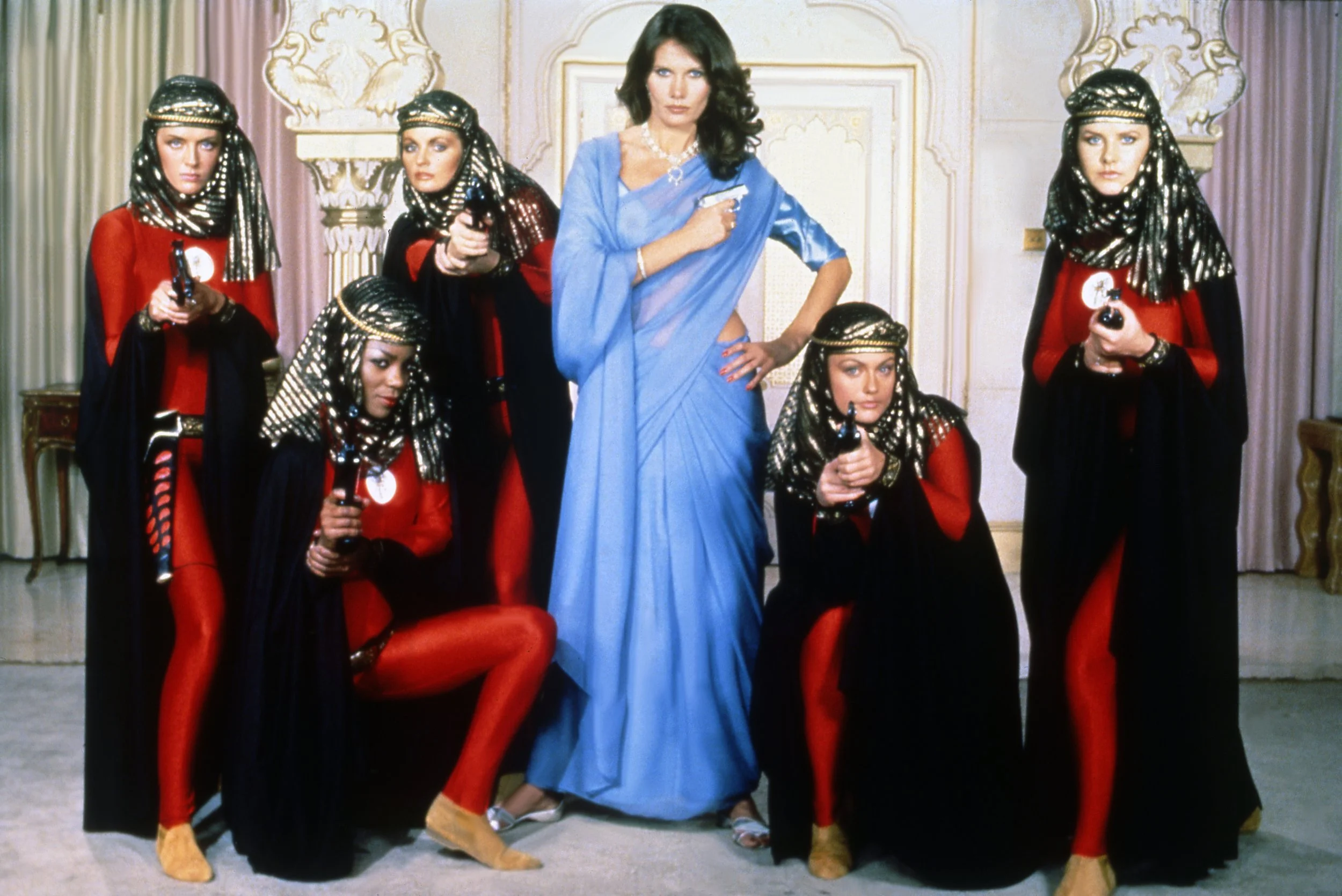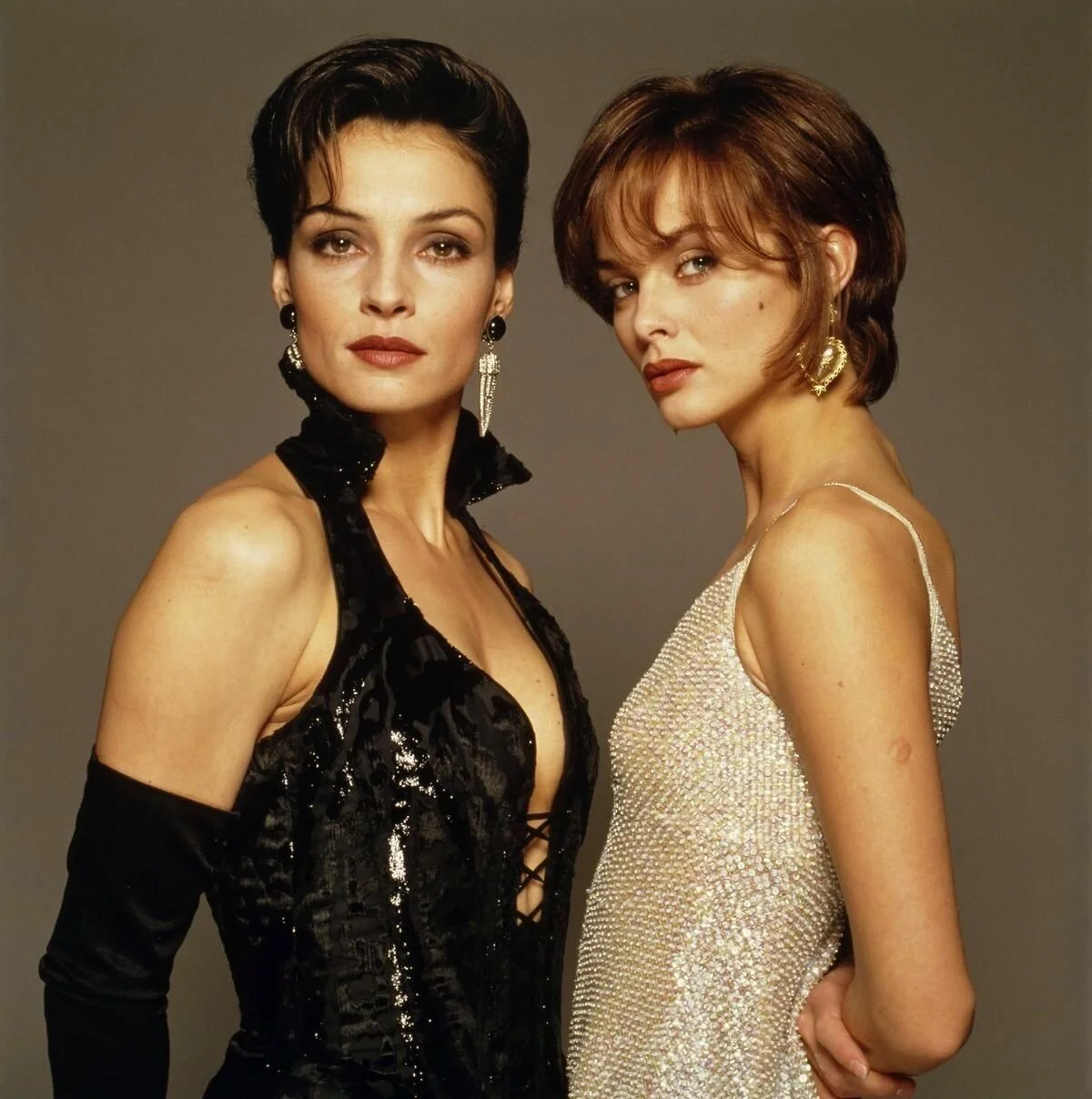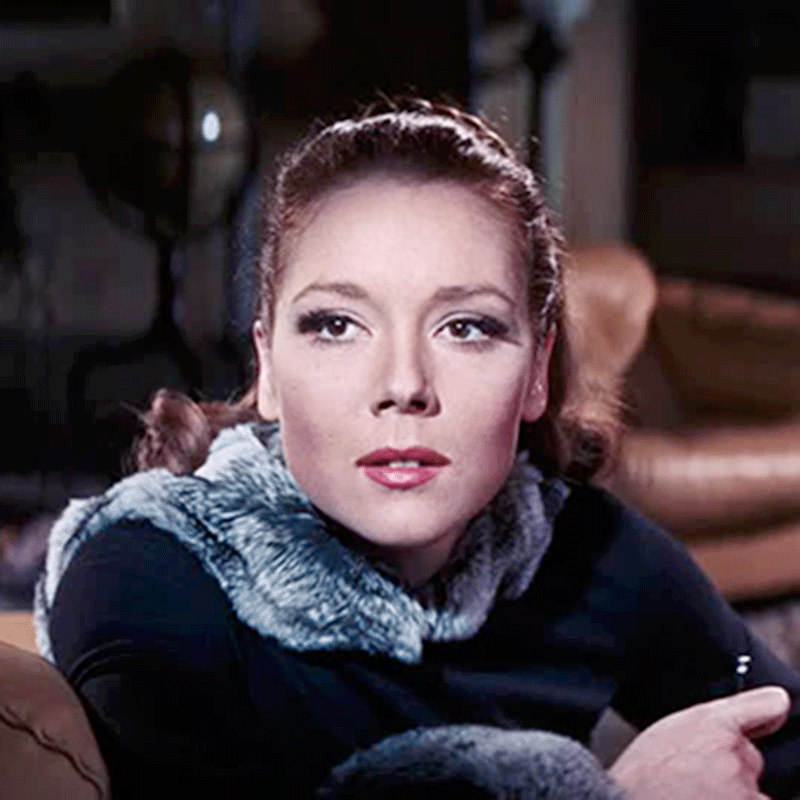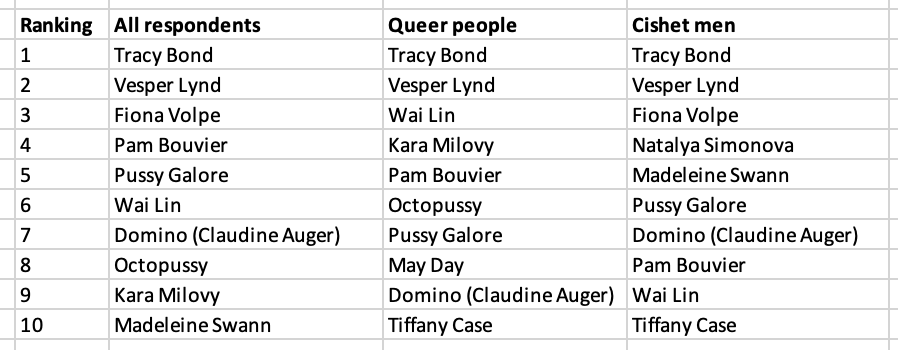Bond Girls are for Everyone: the results (so far)
The enduring appeal of Bond girls goes well beyond their status as sexual objects bringing voyeuristic pleasures to a presumed heterosexual, cisgender male audience. Or does it? In the first research of its kind, we’re investigating the reasons why Bond girls appeal to so many different demographics. Are these reasons the same for gay and straight viewers? Are people with different sexual orientations and/or gender identities drawn to different Bond girls? Here are the initial findings…
Whenever people ask me, a gay man, what I could possibly enjoy about Bond girls I have to resist the urge to shoot back with ‘What could I possibly not enjoy about Bond girls?’. I mean, aside from the obvious (and we’re all capable of appreciating beauty, whatever our personal predilections), what’s not to love?
Whenever I think of a Bond girl, I think of someone fierce. For those of you who don’t speak gay, fierce = ‘extremely well put together, well-performed, fashionable, beautiful’. And even more importantly, they’re fiercely capable, showing everyone that you don’t have to be a straight cisgender man to succeed.
But what does everyone else think?
I’m just one gay man from a WEIRD country. WEIRD as in the acronym for ‘Western, educated, industrialized, rich, and democratic’… although Britain itself is wonderfully weird in other senses too.
Why is it important to recognise this?
Well, I never wanted Licence to Queer to be a platform for merely my own views. Right from the outset, I stated:
“This website is something I’ve had in my head for decades, and a lot of what I have written so far contains thoughts that have been on my mind for a long time. Even so, this is still very much a work in progress. Although I have tried to put myself in others’ shoes in my writing, my perspective is essentially that of a white British cisgender gay man so there will be - inevitably - omissions. That’s why Licence to Queer is, above all, a community: it contains the viewpoints of Bond fans who are lesbian, gay, bisexual, transgender, asexual and aromantic people. And we’re always after new points of view, whether you use any of these labels or not.”
Although the website features contributions from more than two dozen different people - some of whom have written brilliantly about Bond girls - I wanted to go bigger and attempt to discover why Bond girls hold such universal appeal.
In November 2023, I launched a survey, Bond Girls are for Everyone, to collect the views of as many people as possible. The findings will inform an essay I’d been asked to write for a forthcoming book. It’s not too late to contribute your thoughts too if you’ve not done so already.
At the time of me writing this, 165 people have responded.
I want more.
The data I have so far has allowed me to form some really interesting hypotheses, some of which I will share here. But it’s also helped me form more questions. I’ll be sharing some of these too.
In the interests of not skewing the data, if you’ve not already answered the survey I’d appreciate it if you did that before reading on. It will take around 5-10 minutes. Longer if you really want to ponder. Respond here: Bond Girls are for Everyone
For those who have already answered the survey, I’d be interested to hear what you think of these interim findings. You can comment below or get in touch via social media or email.
Thank you so much to everyone who has taken the time to respond. Many of your answers were so thoughtfully considered. Some were practically essays in themselves. I hope to reproduce in the finished book chapter as many viewpoints as the word count will allow.
Interim findings
Before we dive in, let’s just clarify some meanings:
Queer: used here as is ‘survey respondent not identifying as cisgender and/or heterosexual’. I’m very well aware of how reductive it is to treat all ‘queer’ people (e.g. lesbian, gay, bisexual, pansexual, demisexual, asexual, queer, or a combination of these) as one homogenous group and there were interesting variations in the responses to this survey between people of differing characteristics. For instance, based on the data collected so far, non-binary people seem to love Octopussy. Well, they are two of a kind ;)
Cisgender: where your sex that was registered at birth matches your gender identity today (this was how it was phrased on the survey).
Cishet: Cisgender + heterosexual (I’ll abbreviate from this point onwards).
Please note all percentages have been rounded to whole numbers (without decimal points), which seemed sensible with the kinds of numbers we’re dealing with. But do bear in mind this means that total percentages will not always add up to 100%.
Who has responded?
165 people have responded in total.
60% of respondents identified themselves as cishet (traditionally thought of as the target demographic for Bond).
63% identified as straight (heterosexual) with 37% identifying as lesbian, gay, bisexual, pansexual, demisexual, asexual, queer, a combination of these or preferring not to say (4 respondents).
79% of all respondents were men.
13% of all respondents were women.
8% felt they were best described by the terms ‘trans man’, ‘non-binary’ or ‘queer’ rather than ‘man’ or ‘woman’.
The findings so far
How much do we personally connect with Bond himself and Bond girls?
Respondents were asked to:
Think about when you sit down to watch/read/play a James Bond story. Which type of characters do you connect with most?
Throughout this, bear in mind that very few people made a distinction between the different kinds of Bond media (films, books, games) and treated them all as one.
Overall, respondents connected most with Bond himself, then the allies, then the girls and then the villains.
Connecting with Bond
The vast majority of all respondents connect with Bond himself at least ‘Sometimes’ (90%).
Always (24%) Most of the time (32%) Sometimes (33%) Rarely (9%) Never (less than 1%)
The vast majority of men - of all sexual orientations - who responded connect with Bond himself at least ‘Sometimes’ (92%).
Always (28%) Most of the time (32%) Sometimes (32%) Rarely (6%) Never (1%)
The vast majority of women - of all sexual orientations - who responded connect with Bond himself at least ‘Sometimes’ (86%).
Always (14%) Most of the time (36%) Sometimes (36%) Rarely (9%) Never (5%)
These figures are only slightly lower for specifically queer men (87%) and queer women (80%). However, of the relatively few people who ‘Rarely’ or ‘Never’ connect with Bond himself, twice as many were queer than cishet.
Connecting with other characters
A third of the cishet men (33%) said they connect more with allies than Bond himself. Some cishet men connected more with villains (30%) and girls (7%) than Bond himself.
Half of the queer men (50%) said they connect more with girls than Bond himself. Some queer men connected more with allies (30%) and villains (20%) than Bond himself.
Only a third of the cishet women said they connect more with girls than Bond himself (33%) with over half connecting with Bond himself more ‘Always’ or ‘Most of the time’ (58%).
More than half of the queer women (60%) said they connect more with girls than Bond himself. Some queer women connected more with allies (20%) and villains (20%) than Bond himself.
Connecting with girls specifically
The majority of all respondents said they connect with Bond girls at least ‘Sometimes’ (79%).
Always (15%) Most of the time (28%) Sometimes (35%) Rarely (15%) Never (6%)
Of those who said they ‘Rarely’ or ‘Never’ connect with Bond girls, only two respondents were women and 33 were men. But of the people who connected with Bond girls ‘Always’ or ‘Most of the time’ 81% were men.
Interim conclusion
The majority of Bond fans - whatever their charcteristics - connect with the character himself. However, there were some stereotype-shattering individual responses. Such as this:
“I am a cis white male like Bond, so the movies have often been targeted at my demographics. However, I don't see Bond as a role model per se.”
Based on the data collected so far, queer people appear to be only slightly less likely to connect with Bond than cishet fans. People who don’t connect with Bond as much tend to connect with other characters more: allies, villains, girls. While most cishet men said they do connect with the girls on some level, statistically this connection was not always as strong for them as it was for people in all other categories.
Favourite Bond Girls
Respondents were asked:
Of all the Bond girls, if you had to pick one, who is your favourite?
Many respondents expressed their displeasure with being only allowed to choose one. Sorry! They did have the chance to list all of the others they personally adore in the next question, so they calmed things down somewhat.
Here are the results for all demographics of statistically significant size and where results were significant enough to be able to form top tens.
I suppose it’s fitting that so many of you were furious at me: what could be less Bondian than having to choose just one woman? Having said that, the top two picks for each demographic would suggest that Bond fans - of all sexual orientations and genders - want Bond to find ‘the one’?
At first glance, with Tracy and Vesper topping all lists, it would appear that amatonormativity seems to hold sway across all audiences. Many - if not all - of us live in societies where it’s assumed that all human beings pursue love or romance, aspiring to form one half of a monogamous long-term relationship. But are Tracy and Vesper really amatonormative picks, considering how their stories end? Do we Bond fans simultaneously want ‘the one’ while also wanting something else?
Or is it really nothing to do with Bond himself? Are Tracy and Vesper just powerful characters in their own right?
You’ll no doubt have noticed that cishet women don’t - at least yet - have their own top ten list. That’s because only one name came up multiple times: Vesper Lynd. A case of wanting to be her rather than be with her?
The lists above - and the full data set - provoke further interesting questions which I’m looking forward to investigating further.
It would appear, that bisexual women love Domino (the Claudine Auger iteration, as opposed to Kim Basinger and Fleming’s, who each got one vote) as much as the cishet men. Is this more because of her physical attractiveness or because she’s the only Bond girl who gets to kill the main villain?
Several of the girls are adored by queer and cishet people alike: Wai Lin, Pam Bouvier and Pussy Galore. Why these characters?
In one of the survey’s less surprising findings, May Day was beloved of gay men more than any other group. But what is it about the character that appeals so much to them?
Kara Milovy was the preferred choice of many gay men, queer women and non-binary Bond fans. What is it about the character that cuts across so many queer sub-groups?
These - and a lot more questions - will be returned to, soon.
The term Amatornormativity was coined by Elizabeth Brake, in her book Minimizing Marriage: Marriage, Morality, and the Law (2011).
The term WEIRD (Western, educated, industrialized, rich, and democratic) was coined in 2010 in Henrich J., Heine S., Norenzayan A. (2010). ‘Most people are not WEIRD.’ Nature, 466, Article 29.










